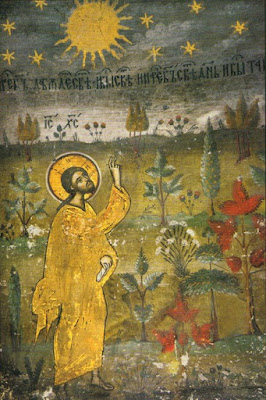Dear Parish Faithful,
Please read His Beatitude's pastoral letter carefully on the Church New Year and the theme of creation. On Tuesday evening, September 3, we will have a service, entitled "Vespers for the Environment." I believe - but am not certain - that this service comes from the ecumenical patriarchate. It reflects a very Orthodox appreciation for the world in which we live, and our vocation to be good stewards of this world given to us by God as a gift.
Fr. Steven
- Read and download Metropolitan Tikhon's message in PDF format. Original posting here.
- Explore numerous resources for youth, teens, families, and parishes on Caring for God's Creation on this special page on the OCA website.
* * *
The Beginning of the Ecclesiastical New Year 2019
Archpastoral Message of His Beatitude, Metropolitan Tikhon
on the Beginning of the Ecclesiastical Year,
the Day of Prayer for Creation
September 1, 2019
To the Venerable Hierarchs, Clergy, Monastics, and Faithful of the Orthodox Church in America,
O timeless Word and Son without beginning, united with the Holy Spirit, Co-maker of all and Co-creator of all things visible and invisible: bless the beginning of this year; bring peace to Thine Orthodox people, through the prayers of the Theotokos and all the saints.
Doxastichon for the Indiction at Lord I Call.
On this day, the Ecclesiastical New Year, the church calls us to contemplate and meditate upon our Creator and His Creation. This first day of the New Year not only marks a renewal of the liturgical cycle, but, as the beginning of the year, it draws our attention to the beginning of all and to God who has no beginning. As such, we are given the opportunity to offer prayers for the preservation of the earth, for the welfare of us who inhabit it, who are part of it, and who crown it, and for God to grant us the wisdom and grace to be good and faithful stewards of this earth, the Lord’s creation, given to us freely and always imparting more gifts for our nourishment, benefit, and life.
It is easy to take creation for granted, to see the world around us as comprising inanimate objects and dumb beasts, servants to our purpose and delight, or obstacles in our way. Indeed, in the beginning God placed human beings at the head of creation, creating us in His image and likeness to have “dominion over the fish of the sea, and over the birds of the air, and over the cattle, and over all the earth, and over every creeping thing that creeps upon the earth.” (Gen. 1:26) Yet, as with our Lord and his Kingship over us, we are not to dominate nature, but humbly commune with it in a relationship of love, of care, and of stewardship.
While Genesis shows that the world was created for the service of humanity, the Psalmist so eloquently puts into divinely-inspired words the ultimate, higher purpose of God’s creation:
Praise the Lord from the heavens, praise Him in the highest… Praise the Lord from the earth, you sea monsters and all deeps, fire and hail, snow and frost, stormy winds fulfilling his command. Mountains and all hills, fruit trees and all cedars, beasts of the earth and all cattle, creeping things and flying birds. Kings of the earth and all peoples, princes and all rulers of the earth, young men and maidens, old men and children! (Ps. 148:1, 7-12)
“Let them praise the name of the Lord!” the Psalmist exclaims. We are of creation, and ultimately ought to be of one mind and purpose with all created things, praising the Lord. While creation praises the Lord by its very existence, we offer our praise to the Lord through our stewardship of creation and created things themselves, a reality revealed so fully in the Eucharist.
Thus, as we celebrate the beginning of the New Ecclesiastical Year, I exhort you to bear in mind the beginning of the world, and the world itself. Let us give thanks for creation, with the words of the beautiful Akathist “Glory to God for all Things” on our lips. Let us contemplate the great mystery of creation, which offers itself for our nourishment and earthly life. Likewise, let us further meditate upon the culmination of creation: Jesus Christ, our Lord, offering his very body and blood, his substance and life, upon the Cross for our life. Let us join the earth, wood and water, sky and stone, praising and worshipping the Lord, the Giver and Creator of Life. May our Lord and Creator inspire us, that we may heal our state of enmity with nature wrought by sin (Gen. 3:15-19), that we may strive for the preservation and renewal of the world, and that we might sing His praises with the earth and all that is in it as good stewards of His creation.
With paternal love and blessings,
+TIKHON
Archbishop of Washington
Metropolitan of All America and Canada














